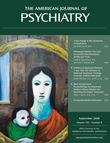Can Discontinuation Trials Inform the Use of Antidepressants in Depressed Children?
To the Editor: In their randomized discontinuation trial, published in the April 2008 issue of the Journal , Graham J. Emslie, M.D., et al. (1) demonstrated that depressed children and adolescents who receive continuation treatment with fluoxetine will remain in remission longer than those whose treatment is discontinued after 12 weeks. Although the trial was rigorously conducted and reported, we have concerns regarding the choice of design, which is not applicable to all depressed children and adolescents, including those who recover spontaneously. Discontinuation trials apply only to patients who respond to medication, and they can be difficult to identify in practice (2) .
To establish the practical benefits of a treatment in populations with high spontaneous response rates (e.g., children, adolescents), a different design is needed in which all patients are randomly assigned to active treatment or placebo and followed for the full study duration. This strategy, also known as the classic two-arm parallel randomized controlled trial, has been used to definitively establish the efficacy of selective serotonin reuptake inhibitors in depressed adults for up to 9 months (3) . Until similar trials have been conducted in children and adolescents, long-term treatment decisions will be based on a select study population of patients who respond to drug treatment. Little guidance is provided for the identification and management of those who recover without drug therapy.
1. Emslie GJ, Kennard BD, Mayes TL, Nightingale-Teresi J, Carmody T, Hughes CW, Rush AJ, Tao R, Rintelmann JW: Fluoxetine versus placebo in preventing relapse of major depression in children and adolescents. Am J Psychiatry 2008; 165:459–467Google Scholar
2. MacLehose RR, Reeves BC, Harvey IM, Sheldon TA: Hybrid study designs and RCT variants. Health Technol Assess 2000; 4:57–80Google Scholar
3. Deshauer D, Moher D, Fergusson D, Moher E, Sampson M, Grimshaw J: Selective serotonin reuptake inhibitors for unipolar depression: a systematic review of classic long-term randomized controlled trials. CMAJ 2008; 178:1293–1301Google Scholar



